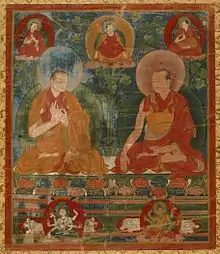Lotsawa
Lotsawa (Tibetan: ལོ་ཙཱ་བ, Wylie: lo tsA ba ) is a Tibetan word used as a title to refer to the native Tibetan translators, such as Vairotsana, Rinchen Zangpo, Marpa Lotsawa, Tropu Lotsawa Jampa Pel [1] and others, who worked alongside Indian scholars or panditas to translate Buddhist texts into Tibetan from Sanskrit, Classical Chinese and other Asian languages. It is thought to derive from Sanskrit locchāva, which is said to mean "bilingual" or "eyes of the world." The term is also used to refer to modern-day translators of Tibetan buddhist texts.

Jnanasutra, a Nyingmapa, was the principal lotsawa of the first wave of translations from Sanskrit to Tibetan.[2]
Yudra Nyingpo, one of the chief disciples of Vairotsana, was also a principal lotsawa of the first translation stage of texts into Tibetan.[3]
See also
References
- "Tropu Lotsawa Jampa Pel". The Treasury of Lives. Retrieved 2018-09-15.
- Rhaldi, Sherab (undated). 'Ye-Shes-sDe; Tibetan Scholar and Saint'. Tibetan & Himalayan Digital Library. Source: (accessed: Wednesday April 1, 2009)
- Mindrolling International (2010). "The History of Mindrolling: Part III". Source: "Archived copy". Archived from the original on 2010-07-13. Retrieved 2010-04-15.CS1 maint: archived copy as title (link) (accessed: Thursday April 15, 2010)